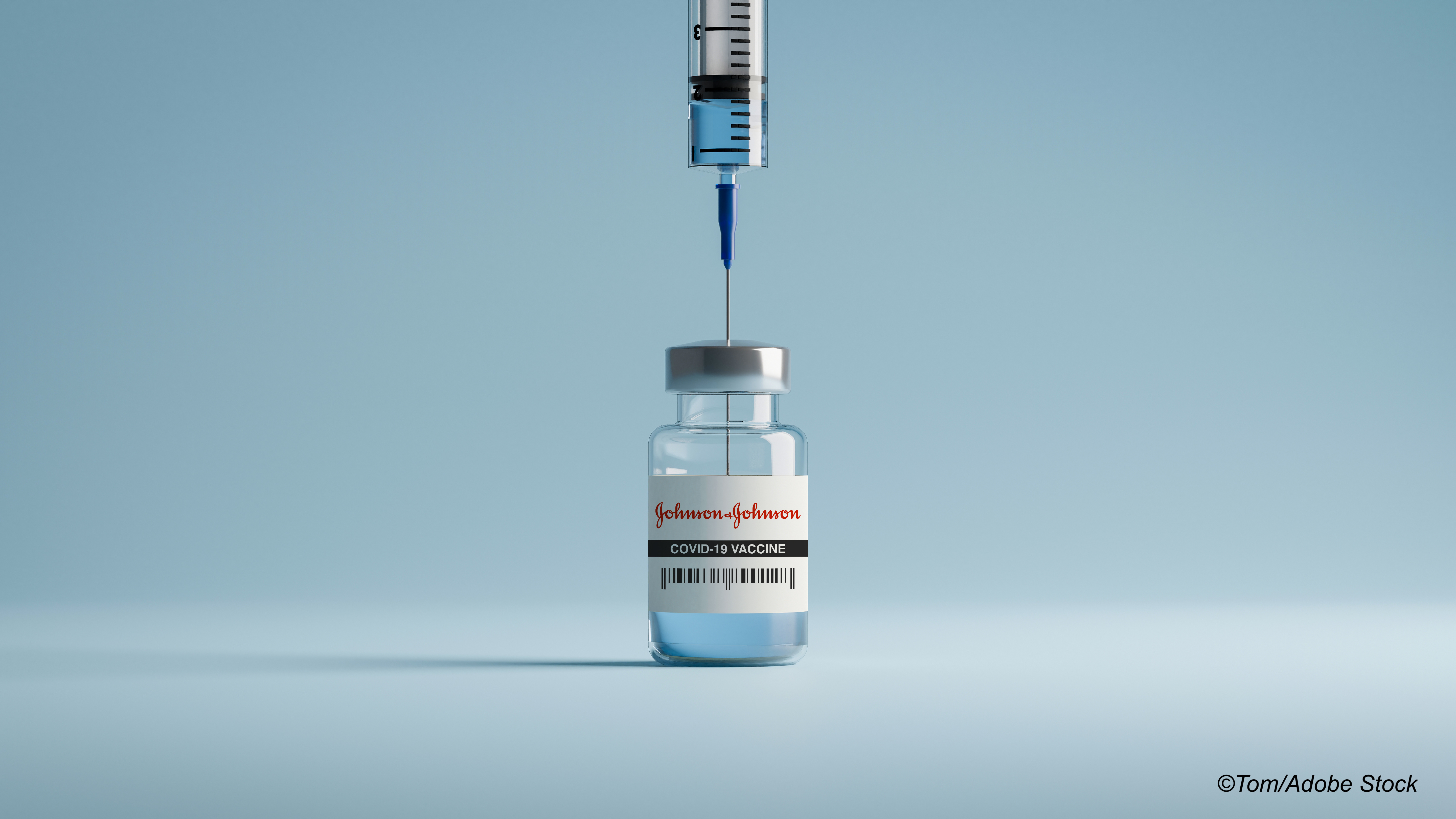The single shot Ad26.COV2.S Covid-19 vaccine (Johnson & Johnson/Janssen) proved to be roughly 74% effective for preventing SARS-CoV-2 infection in a real-world-use analysis from the Mayo Clinic Health System.
The incidence rate ratio of infection in vaccinated versus unvaccinated participants was 0.26 (95% CI, 0.20-0.34), which corresponded to an effectiveness of 73.6%, which was consistent with the 66.9% efficacy reported for the Ad26.COV2.S vaccine against moderate-to-severe disease in the manufacturer’s phase III clinical trials.
The findings “highlight the effectiveness of the vaccine in a cohort in which the SARS-CoV-2 Alpha and Delta variants were the predominant circulating viruses in comparison with the original clinical trials,” wrote researcher Juan Corchado-Garcia, PhD, of the biomedical analysis software company nference Inc., Cambridge, Massachusetts, and colleagues.
The study, published online Nov. 2 in JAMA Network Open, compared outcomes among 8,889 people vaccinated with a single dose of the Ad26.COV2.S adenoviral vector vaccine between late-February and mid-July of this year against 88,898 unvaccinated controls matched for age, sex, race/ethnicity, zip code, and previous number of SARS-CoV-2 PCR tests.
The Delta variant was emergent in the final weeks of the study, and in an accompanying commentary, Zahra Rikhtegaran Tehrani, PhD, of the University of Maryland School of Medicine, and Mohammad Sajadi, MD, of the Baltimore Veterans Affairs Medical Center, both in Baltimore, argued that there were not enough cases in the study to determine vaccine efficacy against the Delta variant.
Sequencing information at the patient level was not available, so Corchado-Garcia and colleagues estimated the prevalence of Alpha and Delta variants using population-level prevalence data.
The commentary writers noted that several recent studies, including one from the U.S. CDC, found the Ad26.COV2.S vaccine to be less effective against the Delta variant than the currently authorized mRNA two-shot vaccines.
In the CDC study, across all ages, vaccine effectiveness was found to be significantly higher among mRNA-1273 vaccine recipients (95%) than among BNt162b2 (80%) or Ad26.COV2.S (60%) vaccine recipients at a time when the Delta variant was prominent (June through August, 2021).
“What is becoming more clear with time is that the single-dose regimen of Ad26.COV2.S vaccine seems to be inferior to the mRNA-based vaccines in terms of vaccine effectiveness,” Tehrani and Sajadi wrote. “Based on the recent findings of Corchado-Garcia et al, as well as a growing body of literature, it appears that the single-dose Ad26.COV2.S vaccine, although providing protection against infection and serious disease in most recipients, still has room for improvement.”
They concluded that this may mean a second dose of the Ad26.COV2.S vaccine—which was shown in a recent study by the manufacturer to increase vaccine efficacy against moderate to severe Covid-19 to over 90%—will be needed, or a second dose with an mRNA vaccine.
The study by Corchado-Garcia and colleagues included 8,889 participants who received the Ad26.COV2.S vaccine between Feb. 27 and July 22, 2021, and 88,898 unvaccinated controls. All participants were members of the Mayo Clinic Health System, which serves clients in Minnesota, Arizona, Florida, Wisconsin, and Iowa. During this period in the U.S., “the pandemic entered a new phase characterized by a flattening in the number of cases due to the massive campaign for vaccination and the expansion of new SARS-CoV-2 variants,” the researchers wrote.
“The Alpha variant was the most common (66.1% in Wisconsin, 71.7% in Florida, and 80.4% in Minnesota until May 31, 2021) but was replaced by the recent Delta variant in June and July (45.1% in Wisconsin, 37.9% in Florida, and 38.2% in Minnesota),” Corchado-Garcia and colleagues wrote.
They noted that following FDA emergency use authorization of the Ad26.COV2.S vaccine in late February 2021, more than 21 million doses of the vaccine were administered in the U.S.
Their study included analysis of the number of new SARS-CoV-2 infections starting 15 days after the study enrollment date until the end of the study period (July 22, 2021). Among people with at least two weeks of follow-up after vaccination, 0.5% tested positive ≥15 days after vaccination, compared with 1.8% of unvaccinated people (a 3.91-fold reduction), for a vaccine effectiveness of 74.2% (95% CI, 64.9%- 81.6%) in preventing SARS-CoV-2 infection, with onset at least two weeks after vaccination.
Examination of the severe Covid-19 composite outcome of hospitalization, ICU admission, and death showed vaccination to be associated with significant reductions in these events (odds ratio, 0.33, 95% CI, 0.19-0.65; P<0.001).
“Our analysis showed a reduction in severe cases, in particular for risks of hospitalization (and trends for reducing the risk of ICU admission and mortality),” the researchers wrote. “However, because only 60 individuals tested positive for SARS-CoV-2 after receiving the Ad26.COV2.S vaccine, our study was underpowered for definitive assessment of mortality. As the vaccine is administered to more patients, we will continue to assess the rates of hospitalization, ICU admission and mortality among individuals who become infected after Ad26.COV2.S vaccination.”
Study limitations include the use of data from only a single health system, the small cohort size compared with previous studies of this and other vaccines, the lack of data on care received outside the Mayo Clinic system, and the approximation of the prevalence of alpha and Delta variants due to the lack of sequencing information at the patient level.
-
The single shot Ad26.COV2.S Covid-19 vaccine proved to be roughly 74% effective for preventing SARS-CoV-2 infection in a real-world-use analysis.
-
Among people with at least two weeks’ follow-up after vaccination with the Ad26.COV2.S vaccine, 0.5% tested positive 15 days or more after vaccination compared with 1.8% of unvaccinated people (a 3.91-fold reduction).
Salynn Boyles, Contributing Writer, BreakingMED™
Corchado-Garcia reported receiving personal fees from and holding stock in nference Inc outside the submitted work.
The Mayo Clinic may stand to gain financially from the successful outcome of this research. This research has been reviewed by the Mayo Clinic Conflict of Interest Review Board and was in compliance with Mayo Clinic Conflict of Interest policies.
Tehrani and Sajadi reported no disclosures.
Cat ID: 125
Topic ID: 79,125,730,933,125,31,926,192,561,927,151,928,925,934



